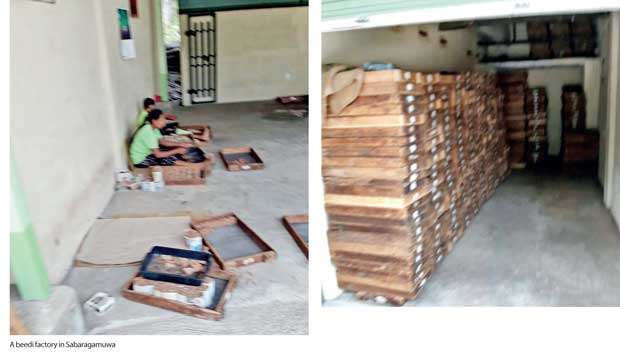Reply To:
Name - Reply Comment

 Last week’s excise increase on cigarettes demonstrate the government’s continued commitment to controlling smoking-related harm, whilst ensuring a steady inflow of revenue to state coffers from smokers.
Last week’s excise increase on cigarettes demonstrate the government’s continued commitment to controlling smoking-related harm, whilst ensuring a steady inflow of revenue to state coffers from smokers.
At Rs.55, a stick of the country’s most popular brand of cigarette is now almost the price of a loaf of bread; priced higher than a bottle of water and a small packet of biscuits.
The available premium brand is at Rs.60. Cigarette prices in the country should serve as an effective deterrent for smokers, especially amongst low income groups, as almost a quarter of the population live on less than US $ 2.5 (Rs.400) a day, according to the Central Bank governor. Accordingly, spending 14 percent of one’s daily income to purchase a single cigarette over essential items such as food naturally becomes a foolish choice.
But these measures will effectively do little to bring victory in combating tobacco-related harm, as the government is concentrated only on controlling what is effectively 43 percent of the total tobacco market. The local beedi trade is just as vast as the cigarette industry, perhaps bigger and then there remains the myriad of questions over illicit.
Beedis are awfully cheap. At Rs.5.00 a stick, a beedi is still Rs.15 cheaper that the lowest priced legitimate cigarette in the country. At this price point, the 25 percent of population living on less than US $ 2.5 a day must only spend 5 percent of their daily earnings to smoke four beedis, presenting a significant advantage to these consumers.
Then it comes as little surprise that more and more smokers, especially in the periphery, have turned to beedi as an alternate to cigarettes. The growth of beedi sales is not readily visible to the government, as there is no effective mechanism of taxation or regulation over this industry.
They are freely available at shops in the city as well as villages and are even available at outlets that do not sell cigarettes due to religious and regulatory pressures. As per estimates based on our research, on average, an outlet vends 2.5 bundles of beedi a day – 50 sticks daily – whilst a woman engaged in manufacturing of beedi will roll up to 1,000 sticks a day. In some villages, this amounted to as many as 250 women working with many as 20 sub-contractors producing branded (over 50 brands counted) and unbranded sticks of beedi.
Sri Lanka’s legal cigarette industry is a little over 3.5 billion sticks annually and employs 45,000 persons across the country, contributing over Rs.120 billion to the general economy. Based on our research, Sri Lankans also smoke over 3.8 billion sticks of beedi annually and this industry employs over 50,000 personnel – primarily women – islandwide, shaping a large informal economy.
The government earnings from the trade are negligible. Despite the increase in cess on tendu leaf imports to Sri Lanka in July 2016, from Rs.350 a kilogramme to Rs.2,000 a kilogramme, it appears that beedi consumption continues unabated.
A school of thought persists that beedi cannot be compared to a cigarette as it employs a smaller volume of tobacco and that it is in essence a traditional cottage industry. However, a beedi is still a tobacco product that when smoked produces the same result or harm as a cigarette does to its consumers and bystanders. This subsequently exercises the same pressure on our health system that cigarettes do. So, why are we turning a blind eye on beedi?
It has been revealed that certain members in Parliament are in fact large-scale manufacturers of beedi. Could this be the reason that beedis receive preferential treatment? The notion that beedis are only consumed by the ageing population restricted to the periphery is also flawed, as several young consumers admitting to smoking beedi due to cost factors, a claim backed up by several shopkeepers we engaged with.
As alluded to before, a mere addition of Rs.5 as tax on beedi stick sales will yield the government Rs.19 billion in additional revenue, at Rs.10 that then translates to Rs.38 billion. Even with a Rs.10 hike, beedi will still remain significantly cheaper than cigarettes but will deter purchases amongst the economically pressed groups. However, the problem persists how to implement such a mechanism, given the only existing process of governance is with tendu leaf imports. Once the leaves clear the Customs, there is no formal tracking whatsoever, with sparse official estimates based on assumptions that one kilogramme of tendu yields 2,000 sticks of beedi. But therein could also lie the solution.
Tendu leaves are imported by registered importers and institutions, which in turn are required to maintain records at the subsequent point of sale. If regulations could be introduced or strengthened to formalize and record all transactions of tendu leaves after it reaches Sri Lankan shores, the government together with officials at the Inland Revenue Department would then have a better understanding on the reach of the leaves and relevant parties engaged in manufacture and marketing of beedi. Thereon, tax or other levies could perhaps be imposed on those identified manufacturers using the same assumption that one kilogramme of tendu yields 2,000 sticks of beedi.
Pricing will have to be adjusted at the point of sale to reflect the levy. The system may not prove foolproof but it can ensure revenues to government, plus, serve as an effective tool in the fight against tobacco abuse.
The campaign against tobacco cannot continue to merely focus attention on the legal cigarette trade. It must accept the challenges posed by the domestic industries such as beedi, which present the same grave health concerns and can give rise to unlawful economic elements.
There has to be a formal process of tracking and levies placed on an industry that large. Then there also has to be a more concerted effort to control the inflows of illicit, which have grown tenfold with the influx of Chinese investments into the island.
If the government is serious about safeguarding and growing its revenue to pay back its immense debt, aspects such as (correct) pricing, levies, local industry management and border controls need far greater attention. These may also help control the rampant growth of narcotics, which at present is a much larger problem than someone smoking a cigarette.
(Ferni Wickremasinghe, a researcher and analyst engaged in ethnographical research into social and economic behaviour in Sri Lanka with Social Development Network, can be reached at [email protected])